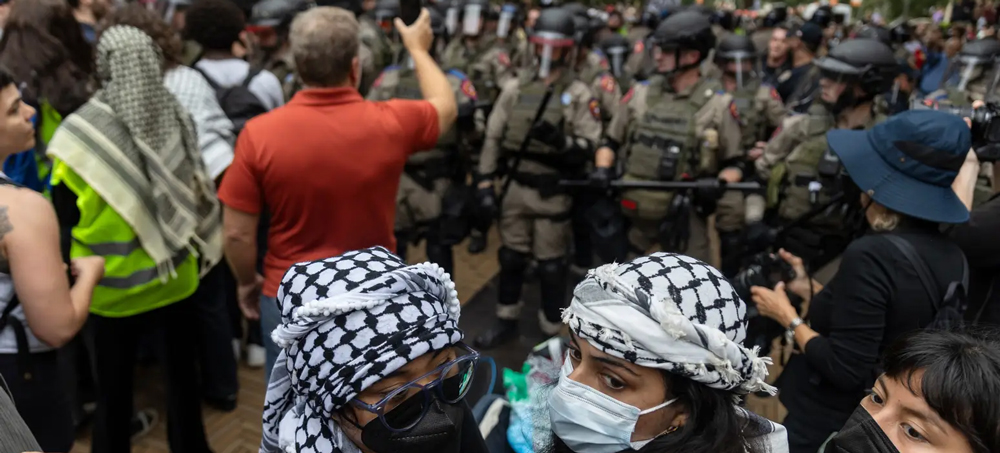What if Gandhi Attended Columbia?
Marc Ash Reader Supported News UT-Austin, 24 April, 2024: Pro-Palestine student protesters a few meters from Police. (photo: Julius Shieh/Texas Tribune)
UT-Austin, 24 April, 2024: Pro-Palestine student protesters a few meters from Police. (photo: Julius Shieh/Texas Tribune) What if Gandhi Attended Columbia?
Marc Ash Reader Supported NewsIn 1964 at Berkeley’s Sproul Hall Mario Savio called for students and presumably all people to as he put it, “… put your bodies upon the gears and upon the wheels, upon the levers, upon all the apparatus, and you’ve got to make it stop.” University chancellor Clark Kerr must have wondered how shutting down the Berkeley campus would change anything for the better. It didn’t initially, but over time campus unrest became a critical component in bringing about the end of the Vietnam war.
It’s always a balancing act in organizing any demonstration, how do you make your point and influence policy makers without allowing events to boil over into violent confrontation. Keeping events civil is often the difference between winning hearts and minds and turning public opinion against your cause.
The father of nonviolent action was of course Mahatma Gandhi. The core of Gandhi’s strategy of nonviolent action was that through determination and adherence to principle great wrong could be confronted and great change could be effected.
The Palestinian resistance movement has never appeared to be particularly moved by Gandhi or his teachings. Rage and violence have always marked Palestinian action against Israeli settlers and what they see as intolerable injustice at the hands of their Jewish tormentors.
Indeed there has been considerable, well documented injustice suffered by Arabic peoples in the Holy Land but there is no indication that events like Munich and 7 October have done anything to improve the situation. To the contrary such approaches to addressing Palestinian grievance appear to have done little more than perpetuate even accelerate the cycle of violence.
It is also important to be aware that there are important examples of cooperation and collaboration between Jews and Arabs in the Holy Land. The Jerusalem Youth Chorus is one such example. Conflict and injustice are not impossible to overcome.
Against that backdrop we view the demonstrations playing out on American university campuses today. Yes order and tolerance can prevail, the protests can remain peaceful, but they don’t have to. University administrators are pretty concerned right now that what is a this stage a big problem could become a much bigger one and that it could happen very quickly.
Protest is a fundamental American right and a cherished tradition with a legacy of bringing about positive change. The pro-Palestinian protests taking place are absolutely legitimate, valid and should be allowed to continue. Organizers must try to act with the purpose, the principle and the discipline Gandhi proved to be so effective. This is a pivotal moment. It can be transformational or it can worsen the cycle of hate and retribution. Gandhi’s way is the proven way for those with the strength to adhere to his teachings.
